Protests over Israel-Hamas war sweep the globe as nations ramp up security
Demonstrations, rallies and vigils have been staged around the world after Hamas militants launched a series of brutal attacks on Israel over the weekend, moving the long-running conflict into uncharted and dangerous new territory.
The death toll has climbed in the days since, with the Israel Defense Forces (IDF) saying at least 1,200 have died in the country, while Israeli authorities believe up to 150 civilians have been seized and taken over the border to Gaza. Israel’s subsequent retaliation on the Palestinian militant movement that controls the Gaza Strip has been ferocious.
Israel’s prime minister, Benjamin Netanyahu, has vowed that the Israeli military would attack Hamas with a force “like never before,” while Defense Minister Yoav Gallant ordered a “complete siege” of the densely populated territory that is home to 2 million Palestinians.
Israel has pummeled what it says are “strategic” Hamas locations in Gaza with near-constant airstrikes despite threats from the militant group to execute hostages. At least 1,055 people have died in Gaza, with some 5,184 injured, according to the Palestinian Ministry of Health.
The unprecedented scale and scope of the Hamas attacks has brought many around the world onto the streets. Supporters of both the pro-Israeli and pro-Palestinian movements have gathered outside embassies and government buildings, further focusing the world’s attention on the tensions between Israelis and Palestinians that have existed since before Israel’s founding in 1948.
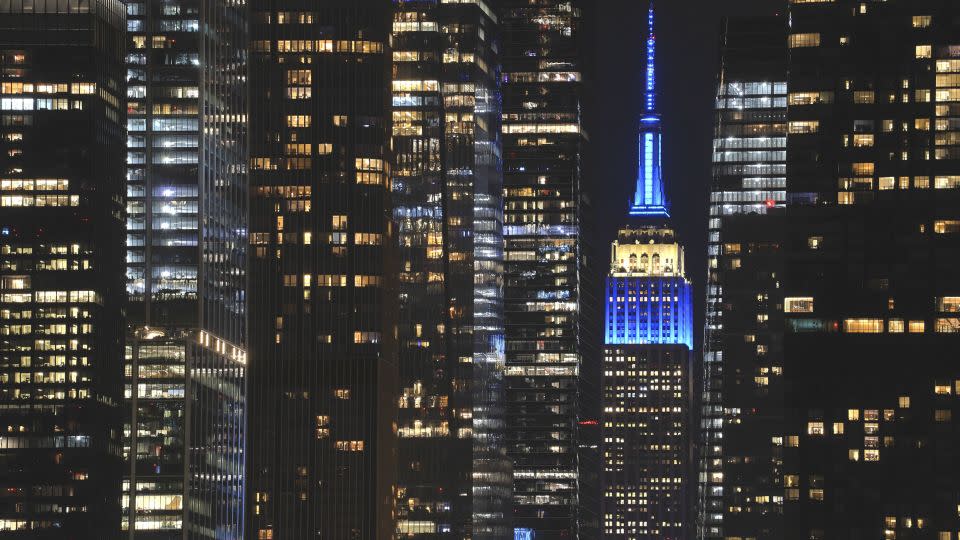
Solidarity for Israel
Many of the world’s most recognizable landmarks have in recent days been illuminated in the blue and white colors of Israel’s flag as a show of solidarity.
From locations such as Paris’ Eiffel Tower and Sydney’s Opera House to the White House in Washington DC and New York’s Empire State Building, there has been an extraordinary display of global support, the likes of which many in the Jewish community have never seen.
Many have also been heartened by the outpouring of condolences and shock from world leaders, officials and well-known figures.
But while the expressions of solidarity have been welcomed by pro-Israeli supporters, cities have also had to reinforce security around houses of worship and other Jewish institutions.
In the United States, the FBI and the Department of Homeland Security issued “public safety concern” bulletins over the weekend to state and local law enforcement agencies although there was no “current specific intelligence indicating a threat to the United States,” according to a law enforcement official.
Kathy Hochul, the governor of New York, said Tuesday that she was briefed by state police, which she said are monitoring potential targets and vulnerable locations around the state, including synagogues, yeshivas and Jewish museums and cultural centers.
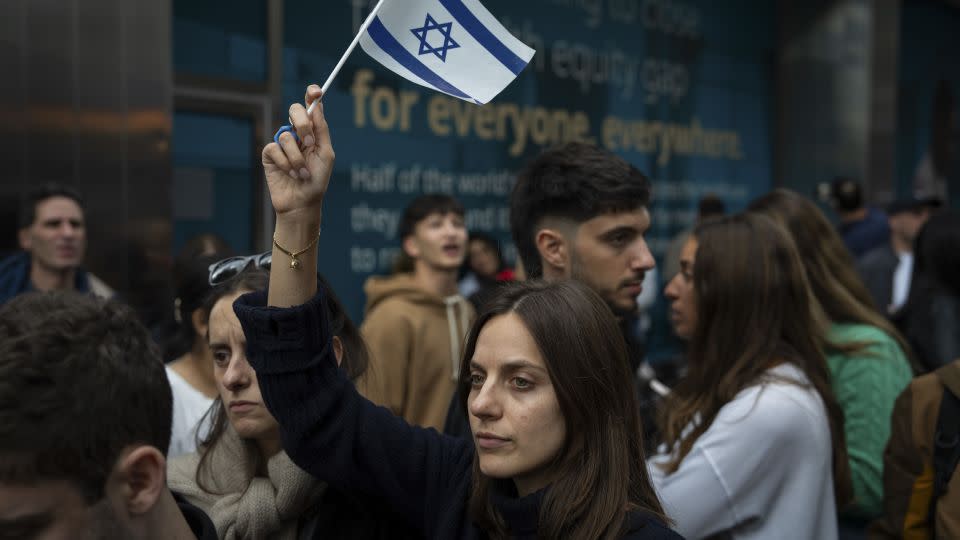
“While there are no credible threats at this time, online monitoring has shown increased chatter from Neo-Nazis, white supremacists and pro-Hamas extremists,” a release from the governor said.
In France, home to Europe’s largest Jewish population, the official response to the attacks has been uncompromising, with President Emmanuel Macron swiftly condemning Hamas and offering renewed solidarity with Israel.
French Interior Minister Gérald Darmanin announced Wednesday that 10,000 police officers had been deployed to protect some 500 Jewish sites, including schools and synagogues, across the country.
Darmanin added that “more than 20” people have been detained in connection with antisemitic threats and acts since Saturday.
On Tuesday, the Paris police chief, Laurent Nuñez, banned two pro-Palestinian gatherings set to take place Thursday over concern that “such gatherings… will be the scene of behaviors, slogans and acts of a principally anti-Jewish nature, inciting racial hate and making excuses for the (Hamas) terrorist attacks.”
The decision followed similar bans on pro-Palestinian protests by police in Lyon and Marseille this week for “reasons of public order.” A march in solidarity with Israel was permitted to proceed in Paris Monday.
France has long had its own issues with antisemitism. According to the European Parliament, official data revealed a 70% increase in antisemitic incidents in France between 2020 and 2022. Over the past decade or so large numbers of French Jews have emigrated to Israel due to the hostilities they have felt at home.
Marie-Sarah Seeberger, head of international affairs at France’s main Jewish organization, the Representative Council of Jewish Institutions of France (CRIF), told CNN that her group had “faith in the French government, French police and their ability to protect Jewish communities.”
She said the CRIF had organized marches in solidarity with Israel, with 35,000 people joining the main demonstration in Paris.
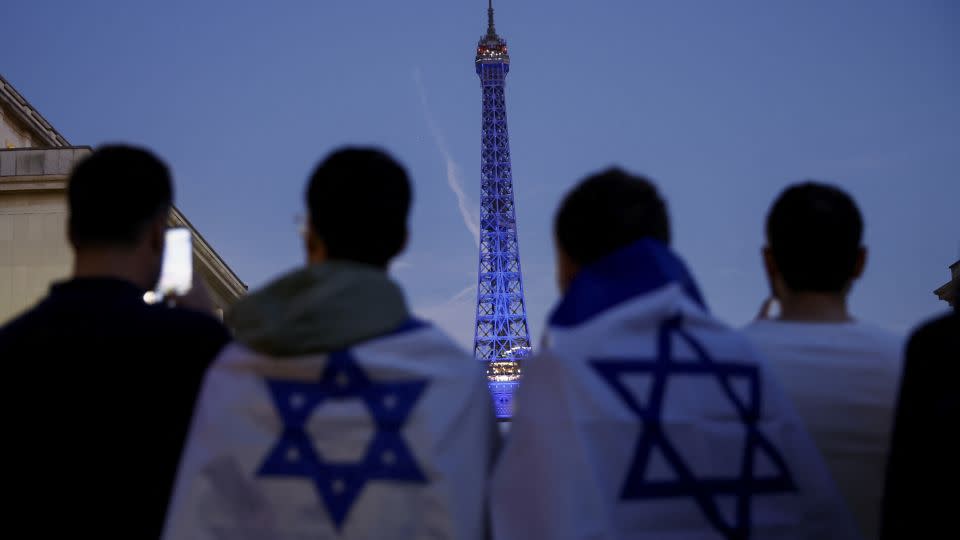
“We would have liked to never organize marches like this. Obviously, the situation was terrible. But this number shows a real solidarity of the French people against terrorism,” she said, adding that the French are “very well aware of what damage terrorism can do to civilians,” referring to the 2015 Islamic State attacks in Paris.
France is one of a number of European nations, including the United Kingdom and Germany, where security measures have been stepped up amid fears of reprisals against members of the Jewish communities.
Authorities acted swiftly after social media videos showed people carrying Palestinian flags apparently celebrating in the streets of Berlin and London following Hamas’ weekend assault.
German Chancellor Olaf Scholz emphasized Sunday that the German government would “not accept it when the heinous attacks against Israel are celebrated here on our streets.” Berlin police also stepped up the protection of Jewish institutions.
Similarly, London’s Metropolitan Police increased patrols across the British capital “in order to provide a visible presence and reassurance to our communities.”
UK Home Secretary Suella Braverman said she spoke with the Community Security Trust (CST), a charity aimed at protecting Jews in Britain, to ensure that the “the government is doing everything necessary for the protection of our Jewish communities.”
“There must be zero tolerance for antisemitism or glorification of terrorism on the streets of Britain,” Braverman stressed.
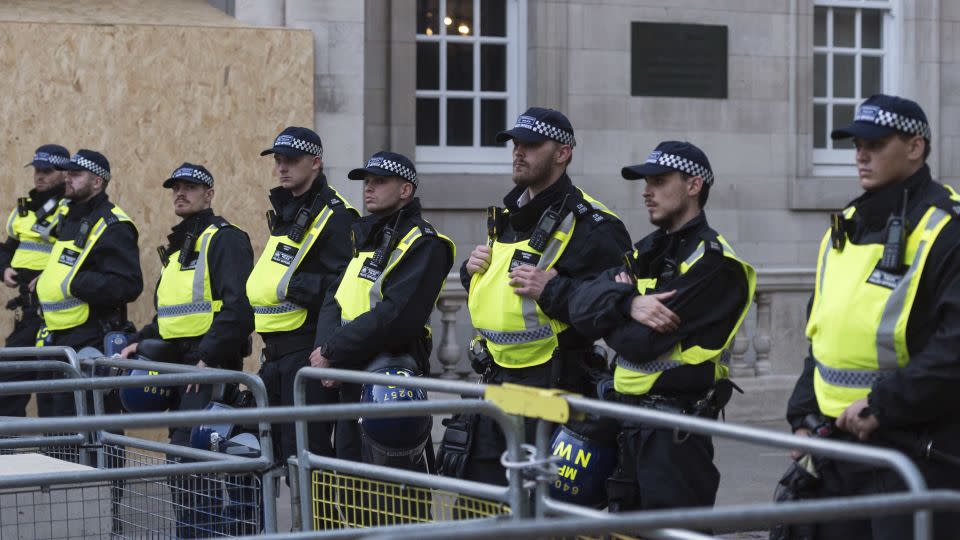
Shockwaves reverberate through global Jewish community
Security has also been ramped up at Jewish schools across Britain. Children as young as 4 and 5 have been affected by the heightened measures, which included some schools canceling outings and sports fixtures due to safety concerns.
Meanwhile, parents at some Jewish faith schools have been advised that their children should remove obvious religious symbols while out in public. It has also been suggested to parents that they remove social platforms from their children’s phones to help shield them from any explicit videos that may be shared in the coming days.
Despite protective moves from officials, many in the Jewish community remain fearful about the reality of what is likely to follow.
“There’s a striking mood of upset within the Jewish community at what has happened in Israel and what is yet to happen there. All that feeds into deeply held anxiety about antisemitism here in Britain and the knowledge that it will impact on British Jews,” Mark Gardner, CST’s chief executive, told CNN.
“As always we have seen an immediate rise in antisemitic incidents – hate crimes – against British Jews,” he said in a telephone interview, adding that such cases had already jumped by between two- and five-fold.
Gardner described the sheer volume of antisemitic social media posts, including the glorification of murder by Hamas, as “off the scale.”
“This isn’t just people being a little bit nasty about Jews or Israel. This is people spreading the most horrific footage filmed by Hamas, proudly, of people being murdered, of people being kidnapped, of people’s bodies… in exactly the same way that ISIS put out for propaganda purposes pictures of beheadings.”
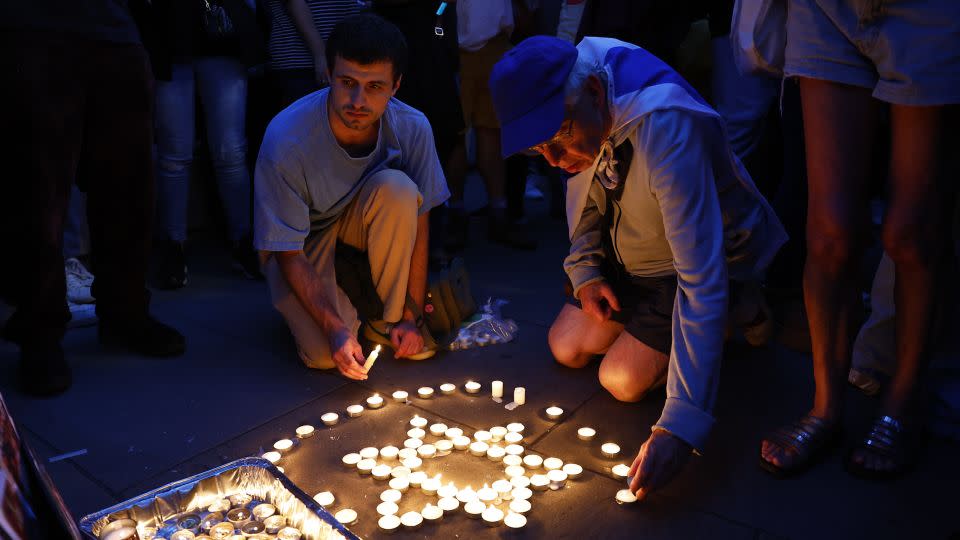
Thousands attended a vigil to pay tribute to the victims of the terror attacks opposite London’s 10 Downing Street, the home of Prime Minister Rishi Sunak, on Monday evening.
The event was organized by the Board of Deputies of British Jews and the Jewish Leadership Council and attended by government and opposition lawmakers, as well as religious and communal leaders.
UK Immigration Minister Robert Jenrick said at the event: “Valorizing the terrorism of Hamas is a serious criminal offense. Those who engage in it, or indeed any other form of antisemitic attack, must be hunted down, arrested and prosecuted.”
Meanwhile, Palestinian groups explained why they felt the need to gather, making sure to be clear that they did not condone violence, such as the atrocities that unfolded in Israel on Saturday.
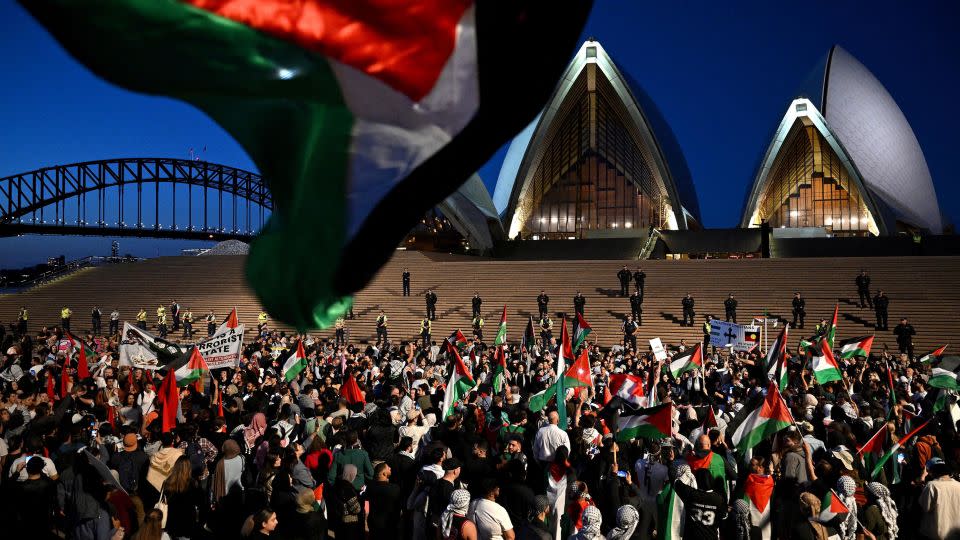
“The immediate context of the attack from Gaza is the intensification of violence by Israel since the election of the most far-right extremist government in its history, elected on a platform of proceeding with the effective annexation of the West Bank,” the Palestine Solidarity Campaign, one of the groups behind a demonstration in London on Monday, said in a statement.
The group added it was acting from a desire to “see an end to all violence, especially violence against civilians, but we recognise that this will never be achieved unless the root causes of that violence are addressed.”
Rabbi Pinchas Goldschmidt is the president of the Conference of European Rabbis (CER), an alliance of more than 700 Orthodox rabbis from across the continent.
Goldschmidt, who was chief rabbi of Moscow until he resigned his position last year over Russia’s full-scale invasion of Ukraine, has been in Israel for the Jewish holidays.
“The mood is very dark,” he said in a telephone interview from Jerusalem, where his organization is helping to direct aid and volunteers to the affected areas.
“This was the largest number of Jewish victims in an attack in one day since the Holocaust,” he said. “Not during the Yom Kippur War, not in the war of independence did we see civilians killed like this. This is Israel’s 9/11.”
Goldschmidt told CNN that the community had been “encouraged” by support from Israel’s European allies and appreciated the “symbolic support of lighting up government buildings.” But he is wary of the days and weeks ahead.
“We think that this war is not going to end tomorrow and as the Israeli forces will enter Gaza we expect a possible backlash in Europe.”
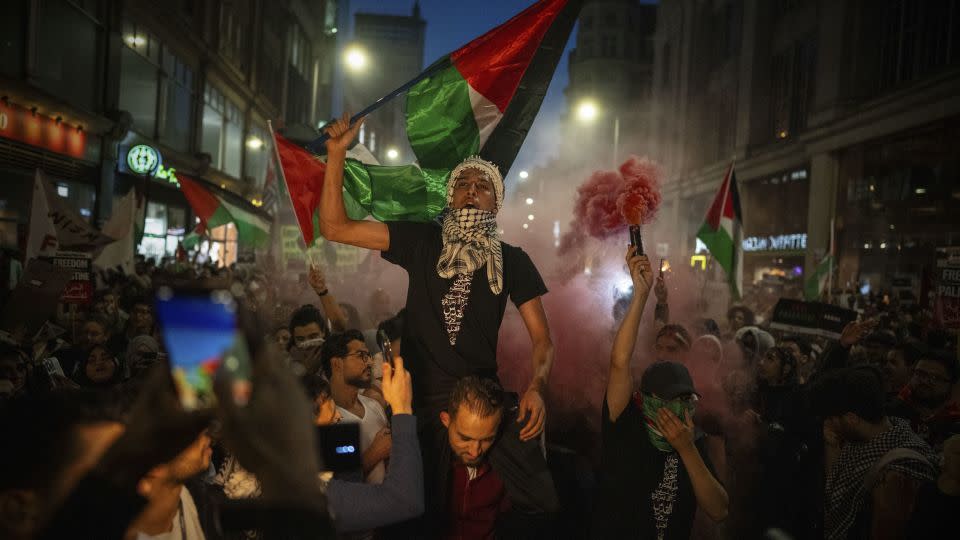
Pro-Palestinian voices feel abandoned
The surge in support for Israel has not been lost on those who support the Palestinian cause. Many have expressed frustration on social media over what they see as global hypocrisy after a years-long blockade of the Gaza Strip created a humanitarian crisis in the impoverished enclave.
Israel and Egypt have for years imposed a strict siege on the territory, which has restricted food, water, electricity, and other basic goods. Israel has also maintained an air and naval blockade on Gaza. More than half of Gaza’s population lives in poverty and is food insecure, and nearly 80% of its population relies on humanitarian assistance.
Gazans have seen Israeli strikes ravage the strip on several occasions since Israeli forces withdrew from the territory in 2005. Fighting regularly takes place between Israel and Palestinian factions in Gaza, including Hamas and Islamic Jihad.
“The situation inside Gaza is dire as homes and civilians remain the indiscriminate targets of continuous bombing,” Nadim Zaghloul, Country Director for the NGO ActionAid Palestine, said Tuesday.
“We’re only a few days into the crisis, but the unprecedented scale of hostilities threatens a humanitarian emergency on an unimaginable scale, even for a region all too familiar with disaster. With a ‘total blockade’ announced in Gaza, over two million people will be plunged even further into crisis and completely cut off from food, electricity, and fuel,” Zaghloul added before calling for an end to the violence and “the safe passage of humanitarian aid to those that need it the most.”
More than 263,000 people have been displaced within Gaza since Israel began retaliatory airstrikes, with the number “expected to rise further,” the United Nations Office for Coordination of Humanitarian Affairs (OCHA) said early Wednesday.
Of this number, more than 175,486 people are seeking shelter in UN schools, while about 3,000 Palestinians in Gaza remain displaced due to previous escalations, OCHA said.
This marks the highest number of internally displaced Palestinians since the 50-day escalation of hostilities in 2014, OCHA said.
Médecins Sans Frontières (MSF), also known as Doctors Without Borders, warned Wednesday that hospitals in Gaza are overwhelmed and experiencing shortages of drugs, medical supplies and fuel for generators.
Executive Director of MSF-USA Avril Benoît said in a statement: “We are seeing shortages of water, electricity, and fuel, which hospitals rely on for their generators. Some hospitals only have enough fuel for four days.”
CNN’s Eyad Kourdi, Alex Stambaugh, Niamh Kennedy, Stephanie Halasz, Alex Hardie, Joseph Ataman, Xiaofei Xu, Celina Tebor and Ibrahim Dahman contributed to this report.
For more CNN news and newsletters create an account at CNN.com

